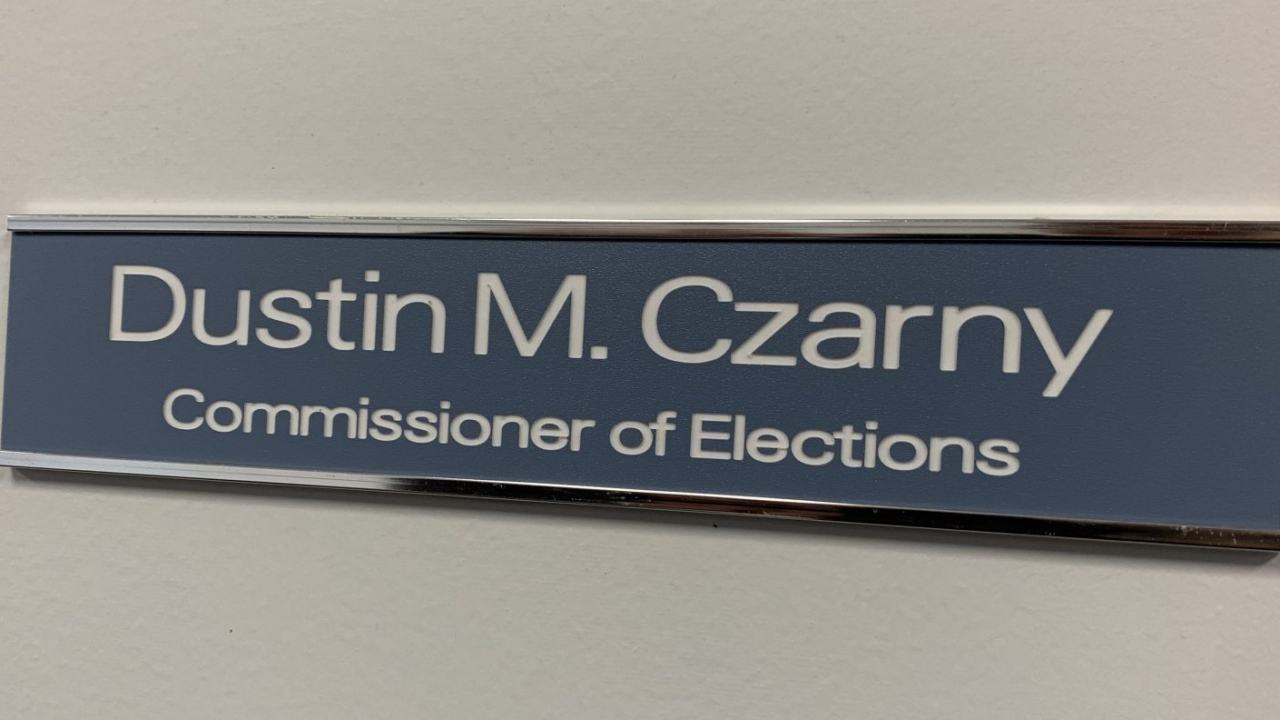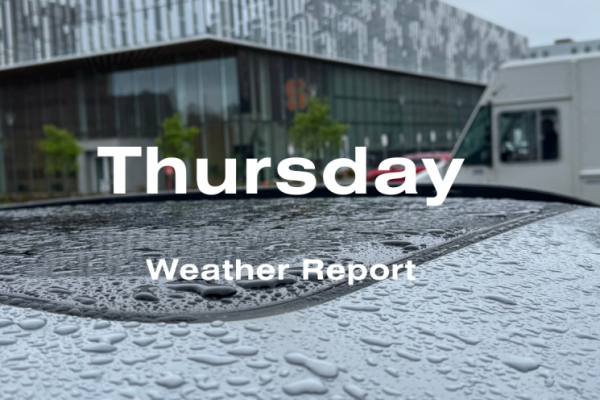
Czarny: Caucus system biggest problem in Iowa, not app
GAMBARO: The Iowa Democratic Party used an app with some technical difficulty to report votes from the caucuses. Czarny says that New York State will not be using an app for its primaries.
CZARNY: In a primary, as opposed to a caucus, we have dedicated employees that are trained and ready to report those results, as opposed to party volunteers that are doing hand calculations of math and then trying to use an app for the first time.
GAMBARO: Czarny says that while using the app was not a smart decision…
CZARNY: You have a party running an operation as opposed to a state government or county government running it with election professionals.
GAMBARO: Iowa’s biggest flaw is its caucus system.
SYRACUSE, N.Y. (NCC NEWS) – Onondaga County Elections Commissioner Dustin Czarny says he disagrees with the Iowa Democratic Party’s decision to use an app to report votes in the state’s presidential caucuses.
The app, Shadow, was put together in less than two months, per The New York Times. Czarny says that a state like New York that holds primary elections does not need an app.
“With having a caucus…you have a party running an operation as opposed to a state government or county government running it with election officials,” he says.
Even if there were a better developed app, Czarny says New York State’s current methods of handling elections are efficient enough as they are.
“Our reporting system is better than most…around the states,” he says. “We have dedicated employees that are trained and ready to report these results.”
There have not been any plans for New York State to use an app in its upcoming primary elections. For now, April 28, 2020 will operate like any other primary for New Yorkers.
Dustin Czarny Full Interview 2/11/2020
*conversation*
CZARNY: So, like, you know, I mean this is…especially with a caucus system which is, just, really relying on volunteers instead of election professionals. That’s problematic.
GAMBARO: Alright, well, so how do you feel about the Iowa Democratic Party’s decision to use this app for the election?
CZARNY: Well obviously it was a flawed decision. You know the app hadn’t been field tested and it didn’t work and, you know, they haven’t really done it, but from what I understand, the biggest problem that they had also was that the phone lines were tied up and initial reports – so, the backup system, you know, which was to call in – the initial report said that the phone lines were busy all night long and a lot of people blaming the Iowa Democratic Party on there but there’s been reporting out there that there was actual election interference where, you know, GOP operatives were calling into the line and clogging up the line, whether that was coordinated or whether that was just enthusiastic volunteers…but they also had, you know, very few; I believe a couple thousand operators, because they assumed most of the traffic was going to come in through the app. And you also had problems with like people not downloading the app, not being familiar with the app; they’re reporting three sets of data as they used to only report one set of data, so it was a perfect storm. It seems that they had a, you know, a statewide central location instead of, like counties that report in and then up to the state, like we do here in New York. So that’s the problem with having caucuses as opposed to primaries where you have a party running an operation as opposed to a state government or county government running it with election professionals.
GAMBARO: So, what do you see some advantages and disadvantages to using an election app to count the votes?
CZARNY: Well, I mean, let’s be clear the election map was counting votes, it was only reporting the results; the counting of the vote is still done by the humans in the precincts in Iowa. So, you know, by manual counts and paper recorded backups. So, the count…I think there’s been some misreporting on that or some misperception. All the app was supposed to do is take those results that were already counted and transmit them to a central point, that would then collect them all and transmit them out instantaneously on election night, that’s what’s failed. The actual counting of the votes and the paper backup from what I understand, is mostly with some minor errors in the calculations by humans on the ground, is you know has been mostly conceded to being correct.
GAMBARO: So yeah, the reports described it as a voting tabulation app. So, I think there, that’s where the confusion was so…
CZARNY: Well, it does tabulate, but the results…the way a caucus works so they, you know, they hand count the people in the room. Who, like, stand in certain corners. It’s really an arcane way of doing it and that’s part of the problem is that instead of having a primary where people are voting on election machines… and we’re trying to do these weird, like, you know, you have to have 15% to be viable, you’ll have another round of voting, those people who aren’t viable can go to another camp or other people can go to change camps. That kind of arcane electoral system, while it makes for good video and fun stories, is really a horrible way of determining the populace feels of who are their preference of candidates, especially very early on.
GAMBARO: Okay so, as a member of the Democratic Party, do you feel that this whole fiasco is had any implications on your party’s near future?
CZARNY: The party’s nationwide. The party is, you know, I’m in New York, I’m not in Iowa. I think it definitely has implications on Iowa’s future. You know, their first in the nation status is going to be -I t’s already been questioned going into this – and I think this gives fodder to the people – and I’m one of them – who believe that having two representative states like Iowa and New Hampshire always be first that are not necessarily representative of the rest of the country is problematic. And I would love to see some reform and the next four years, we’ll see what happens. It’s hard to reform, because there is no nationwide structure. All states control their own primaries, but the party has some say. But it would need both parties to, you know, so that’s part of the problem is that there’s no consensus of how to fix it. A lot of people believe it’s wrong, but there’s no consensus of how to fix it. The Republicans, Iowa and New Hampshire reflects their voter base, so they’re fine with it. Whereas with the Democrats, it does not.
GAMBARO: Okay so shifting more kind of locally now, do you foresee us using any of these apps here in like New York or Onondaga County?
CZARNY: No, we don’t need it. We have a system of reporting that, you know, our machines record the votes. There are SD cards in the machines that are physically driven to the office, and dropped off, and then put into a computer so there is no internet capacity there. And then those reports are converted and given to an outside vendor that reports it. Now we had our own issue reporting on 2019, which, because we were reporting early voting results for the first time, resulted in a one-hour delay in results getting up. But because election professionals were involved, because we had a county government system, because we had a state system. We were able to get results up in a pretty quick way.
GAMBARO: So, so I assume you’re saying that you know just the old-fashioned way is more effective…
CZARNY: It’s not old-fashioned. Our reporting system is better than most of the people around the States. There is some technology involved, but because we are invested in a primary as opposed to a caucus we have dedicated employees that are trained and ready to report these results as opposed to party volunteers that are doing hand calculations of math and then trying to use an app for the first time. So, you know, we have a better system in place.
GAMBARO: Very well, so I assume we won’t really be considering any of these in the near future, how about the distant future?
CZARNY: There is no need. I mean, we don’t run caucuses – we run primaries in New York. In the town levels when they do caucuses, they’re a single reporting they don’t need to collaborate those reportings with other caucuses going on around the state or town, so there’s no need.
GAMBARO: Yeah, so it’s unnecessary was what you’re saying.
CZARNY: For us. I mean, Iowa has to figure out what they’ve got to do any time, any state that has a statewide caucus system – which I believe they should get rid of – they should go to statewide primaries, but any state that has a statewide caucus system has to figure out how they’re going to collaborate those results at the end of the night and report them all as one total result. And that’s different, you know Iowa has some more complications; it’s not just popular vote, it’s state delegate equivalents. It’s not just one round of voting, it’s several rounds of voting. So, those complications added to the problem on election night.
GAMBARO: So, I guess about in terms of New York State primaries, what’s your role in administering how the election goes down in Onondaga County?
CZARNY: As commissioner, you know, the buck stops at my desk…every decision is made. We have election law that we have to follow, we have a state board that gives us guidelines on how to proceed forward. But other than that, you know, the actual day to day administration is on us.
GAMBARO: Alright, so, do you think that if an app were better developed – according to The New York Times, they rushed it together in less than two months – do you think it was more developed that it could perhaps succeed?
CZARNY: Again, I don’t think the blame only lies with the app; the blame lies with the caucus structure itself, where you’re relying on party volunteers to do things. You could have the best reporting app…in 2012, you saw the same Iowa caucus structure show that Romney won on election night and then we found out that it was actually Rick Santorum that won and they had to announce that a week later. So this is not a “just this app” problem. The app was definitely rushed, definitely flawed, there definitely deserves blame there. But the caucus structure itself is lending to these issues, especially when there are close elections.
GAMBARO: Alright, well, I think that’s really all I need from you so thank you so much.
There is a great deal of blame to be had for the Iowa caucus but the biggest issue is the caucus model, specially statewide caucusing, is fundamentally flawed and should be discarded everywhere. Thread 1/10
— Dustin M. Czarny (@DustinCzarny) February 4, 2020
Natural Sound from the Onondaga County Board of Elections (inside)
*natural sound*
Natural Sound from the Onondaga County Board of Elections (outside)
*natural sound*




